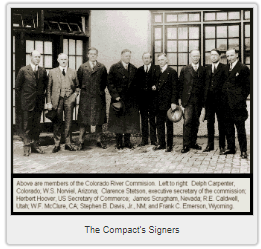Episode 19: November 24th, 1922
A century ago in Colorado River Compact negotiations: the Compact is signed
By Eric Kuhn and John Fleck

Wordsmithing “Unperfected Rights”?
Unable to reach a final agreement on Article VIII on Thursday evening, the Commission met again on Friday morning, Nov. 24, 1922, at 10 AM. They began with a discussion of “unperfected rights.” The concept behind the article was that rights that were then using water would not be impacted by the compact but once storage of at least 5,000,000 acre-feet of capacity was available, perfected rights on the lower river, like the Imperial Irrigation District, would be solely satisfied by that storage and would no longer have the right to call for water being used by junior rights upstream of Lee Ferry. All unperfected rights, including what Hoover call “inchoate rights” – those that were being planned but were not yet using water – could only consume water apportioned to the basin in which they were situated.
There were many of these inchoate rights out there, including George Maxwell’s Arizona Highline Canal which would eventually evolve into today’s Central Arizona Project. There was also the Girand Project, a proposed large private power dam in what is now the western Grand Canyon, and Los Angeles was in the early stages of exploring an aqueduct from the Colorado River. The compact would be useless if these types of projects had potential claims on the water uses above Lee Ferry. The commission finally, but reluctantly, agreed to:
“Present perfected rights to the beneficial use of waters of the Colorado River System are unimpaired by this compact. Whenever storage capacity of 5,000,000 acre-feet shall have been provided on the main Colorado River within or for the benefit of the Lower Basin, then claims of such rights, if any, by appropriators or users of water in the Lower Basin against appropriators or users of water in the Upper Basin shall attach to and be satisfied from water that may be stored not in conflict with Article III. All other rights to beneficial use of waters of the Colorado River System shall be satisfied solely from the water apportioned to that Basin in which they are situate.”
New Mexico’s Stephen Davis summed up the attitude of many of the commissioners when he declared “I will register my vote as a ‘yes’ on that article. I do it only because to my mind it is the least objectionable of the attempts that have been made to frame the idea expressed in it, and not because I approve it.” Before approving the compact, they made at least two more changes that morning. They agreed to drop the introductory sentence in Article III and they dropped the definition of “apportionment” in Article II. (Note: at some point they also changed the accounting year in III(d) from July 1 -June 30 to October 1- September 30, but there is no mention of it in the minutes.)
The Commission held one more meeting that afternoon, its 27th formal meeting. It was mainly for housekeeping matters. They refused a request by Arizona’s Norviel to either support or not oppose the Girand Project that was then pending before the Federal Power Commission. Instead, they agreed that Hoover should send a letter asking that any future power permits be made subject to the compact. They then passed a resolution supporting the construction of a large dam on the Colorado River by the U. S. Government. The two actions were related. Hoover, Arthur Powell Davis, and McClure all opposed the Girand Project because they believed it would interfere with the proposed Boulder Canyon Project.
Reflecting on What They Accomplished
Before ending the meeting, they took time to congratulate one another on what they had accomplished. On behalf of his fellow commissioners Delph Carpenter, who nearly three years ago had suggested a compact be negotiated, made the following remarks for the record.
We have about completed the task assigned to this commission, which is the first exemplification of interstate diplomacy in the history of the United States on so large a scale.
Carpenter went on to thank Hoover:
Our Chairman is due the great measure of credit for making possible this successful conclusion.
Hoover thanked all those present noting.
It has been one of the problems of more extreme complexity than will ever be appreciated by the outside world; and in the sense of service, and in the sense of restraint and in the willingness to compromise, it also has striking character. Had it not been for the character of the men who have been here, there would have been no compact.
Hoover went on to add that the “days of romance of the West are gone, and the job of western man is one of construction.” Adding, “It is possible this will standout as one of the landmarks of Western development.”
The commissioners then made the trek through the snow into Santa Fe where they signed the compact at the Palace of Governors.

